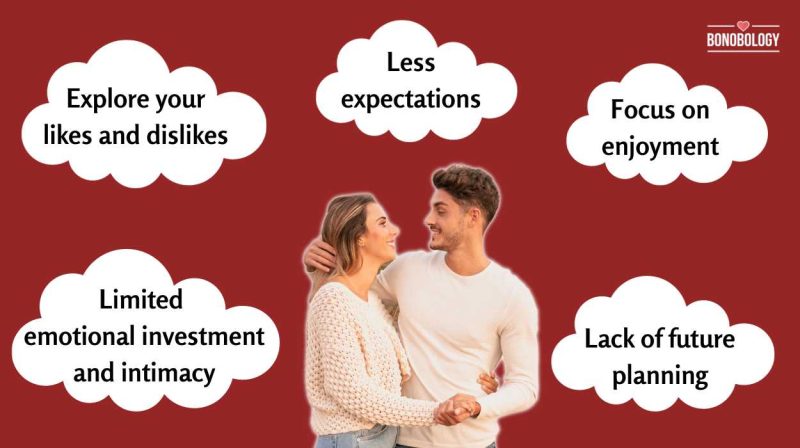A friend, who’s knee-deep in the dating scene, told me recently that she’s been meeting up with many guys who only have short-term relationships. It’s perfect because she’s not ready for a serious relationship either. If you, too, are thinking of going on a date with someone who’s not looking to commit long-term, you need to understand the unique characteristics and challenges of a short-term relationship.
Recognizing the difference between short-term and long-term relationships is vital too. According to research, “At some point, romantic interest tends to plateau and decline in short-term relationships, while in long-term relationships, it continues to ascend and reaches a higher peak.”
Short-term relationships typically refer to the romantic or intimate relationships between two people that are not ‘intended’ to be long-lasting. Effective communication from the very beginning is crucial if you’re having a temporary relationship, though. Because while short-term relationships are typically less emotionally intense than long-term ones, a strong emotional connection can still develop.
What Is A Short-Term Relationship?
Inherently time-limited, short-term relationships tend to prioritize the present moment rather than long-term planning. People have fun, explore shared interests, and experience intimacy without the pressure of building a future together. This is why, before diving into the complex emotions of short-term fun, you need to make sure that your potential partner is up for it.
These dynamics are very different from a friends-with-benefits situation. Here, you have a say in each other’s love lives as long as you’re with each other. It’s not a one-night stand either — The short period we’ve been referring to can’t be ‘that’ tiny. So how long is a short-term relationship? Short relationships vary in length as they could go on for weeks or a few months, maybe even a year.
Some of the basic characteristics of short-term relationships are:
- Limited duration
- Casual nature, but not necessarily
- Limited emotional investment and intimacy
- Lack of future planning
- Focus on enjoyment
- Less expectations
- May be a monogamous or polyamorous setting
This short-term fun can take various forms, such as casual dating, flings, or situations where both individuals are aware that the connection is not meant to be permanent (e.g., one of them has to leave the country in a few months). People engage in casual relationships for various reasons, including physical intimacy, exploring their own desires and preferences, seeking companionship or physical intimacy without a long-term partnership, or simply enjoying the present moment without planning for a future together.
It’s important to note that not all relationships are strictly categorized as either short-term or long-term, because some may start as temporary but evolve into long-term commitments, given the time frame and if both parties decide to continue and deepen their connection. This requires both the partners to be fully committed.
Related Reading: How To Connect With Your Partner On A Deeper Level – Expert Helps
What Are The Benefits Of Short-Term Dating?
Defining the benefits of a short-term relationship, a Quora user said, “The pros of a short-term relationship: No commitment! Do what you want, leave if you don’t like it. You are only there as long as it benefits you in the short-term, and if you ever change your mind, don’t like it anymore, find someone better, you are not tied to anything.”
Short-lived connections can offer many benefits depending on an individual’s goals, preferences, and circumstances. So either go for gals and guys who only have short-term relationships, or clear your intentions to your partner beforehand. You don’t wanna be a heartbreaker, do you? Here are some potential advantages of engaging in temporary relationships:
1. Exploration and self-discovery
Short-term dating allows individuals to explore different types of relationships and discover what they are looking for in a partner. It can help people better understand their own preferences, desires, relationship style, and boundaries in romantic relationships. Each short-term relationship can serve as a valuable learning experience.
2. Having a short-term relationship gives you flexibility
Such ephemeral relationships provide flexibility in terms of commitment and time allocation. Here are the benefits:
- They allow individuals to enjoy companionship, intimacy, and dating experiences without the pressure of a long-term commitment or the need to plan for a shared future
- Some individuals may not be ready or interested in a long-term commitment at a particular point in their lives owing to lack of emotional space for commitment
- A short-lived romance allows them to date without too many expectations and make their daily schedules without feeling guilty or pressured by their partner
Related Reading: Expectations In Relationships: The Right Way To Manage Them
3. Emotional and personal growth
Short-term dating can contribute to emotional growth and resilience. It allows individuals to navigate the complexities of relationships, handle breakups, and develop emotional maturity.

4. Variety and enjoyment are guaranteed
Short relationships can offer variety and excitement in one’s dating life. Meeting different people and having diverse experiences can be enjoyable and fulfilling. But for a great experience, try to spend time with your partner, communicate, and most importantly, have safe sex.
Related Reading: 11 Types Of Casual Relationships That Exist
5. Reduced pressure adds to the short-term fun
Long-term relationships come with their share of stress and challenges. A few benefits of a brief romance:
- A temporary dating period can help individuals avoid some of the stress associated with maintaining a lasting partnership in front of family and friends as well as in their own lives
- Short-term dating involves less pressure to meet evolving compatibility needs of a partner
- This can lead to a more relaxed and enjoyable dating experience
6. Easier management of time and energy
Short-term dating can be a practical choice for people with busy schedules or other priorities. It allows them to manage their time and energy more efficiently. It can be a good choice for people who want to prioritize their personal goals, career, education, or other aspects of their life without the demands of a long-term relationship.
Related Reading: 5 Brutally Honest Truths About Long-Term Relationships
It’s important to note that the benefits of short-term dating can vary from person to person, and what may be advantageous for one individual may not be the same for another. Ultimately, the key is to be clear and honest with oneself and potential partners about one’s intentions and expectations in order to ensure a positive and respectful dating experience for all parties involved. However, before entering into a short-term dating situation, there are certain things you should know.
How To Know If A Short-Term Relationship Is Right For You?
Having a successful short-term relationship and to determine whether it is right for you involves self-reflection and considering your own goals, preferences, and circumstances. A Quora user suggested that the best way to gauge if a short-term partnership is right for you is to try it out. They said, “One way to find out is to explore and discover. This is what happens in a short-term relationship. Initially, the relationship may meet some short-term needs and desires. Over time other needs and desires may not be getting met and the relationship fizzles. So onto the next one.”
Short-term dating requires both the partners to be on the same page. Here are some steps to help you assess if a short-term relationship aligns with your needs:
- Introspect on your personal goals
Ask yourself what you are looking for in a relationship at this stage in your life. Are you seeking companionship, casual dating, physical intimacy, or a serious, long-term commitment in the form of either monogamy or polyamory? Consider your short-term and long-term goals in both your personal life and career. How does a relationship fit into your overall life plan?
Related Reading: 9 Polyamorous Relationship Rules According To An Expert
- Reflect on your emotional readiness
Assess your emotional readiness for a short-term relationship. Are you comfortable with the idea of a non-committal connection, or do you have a strong desire for a long-lasting partnership? Consider your past experiences with relationships. Have you had positive or negative experiences with a transitory dating period in the past? - Communicate your intentions
Be clear about your intentions and expectations when you start dating someone. Transparency is crucial in ensuring both you and your potential partner are on the same page regarding frequency of meet-ups, expectations regarding calls and messages, interactions with social circle, etc. Work on ways to improve communication.

- Ask yourself why you’re seeking a short relationship
Be honest about what you genuinely want and need in a relationship, even if it differs from societal expectations or what others may desire. Avoid entering a short-term relationship if it’s not aligned with your true desires, as it can lead to dissatisfaction and emotional turmoil. - Evaluate compatibility
Assess whether you and your potential partner share compatible goals and preferences. If one person is looking for a short-term relationship while the other desires a long-term partner, it will lead to complications.
Related Reading: 15 Signs Of Relationship Compatibility Between You And Your Partner
- Evaluate the timing
Consider whether your current life circumstances and responsibilities allow for a short-term relationship. Are there any major life changes or commitments that could affect your ability to date casually? - Seek support and advice
Discuss your thoughts and concerns with trusted friends, family members, or a therapist. They can offer valuable insights and perspectives on your situation. Should you need it, skilled and experienced counselors on Bonobology’s panel are here for you. - Monitor your feelings throughout the relationship
Pay attention to your emotions as the relationship progresses. If you find yourself developing strong feelings and attachment, consider whether continuing a short-term relationship is still the right choice for you. - Reassess as needed
Periodically reevaluate your relationship and your own feelings. If your goals or feelings change, it’s important to communicate openly with your partner and make adjustments accordingly.
Ultimately, what is right for you in terms of a relationship will depend on your individual needs and circumstances. It’s essential to prioritize open communication, honesty, and self-awareness when deciding whether a short-term relationship aligns with your desires and goals. Remember that there is no one-size-fits-all answer, and your relationship preferences may evolve over time.
How To Have A Successful Short-Term Relationship?
A successful short-term relationship, like any relationship, requires certain considerations and practices to ensure that both you and your partner have a positive and fulfilling experience. One of the challenges in having a temporary relationship is the potential for mismatched expectations. If one person seeks a casual fling while the other hopes for something more serious, it can lead to difficulties and misunderstandings. One of the best ways to find a suitable short-term partner is taking the help of a dating app and writing a clear-cut bio. Here are some tips for having a successful short-term relationship:
1. Define expectations clearly
From the outset, communicate openly with your partner about your intentions and expectations. Be clear about the nature of the relationship and whether it’s intended to be short-term or casual. If you’re not sure about what you want, tell them. Let them decide if they still wish to be with you.
Related Reading: 12 Realistic Expectations In A Relationship
2. Choose a compatible partner
Select a partner who shares similar goals and desires for a short-term relationship. Compatibility in terms of values, interests, and lifestyle can contribute to a more enjoyable experience. Do not go for someone who wants lifelong commitment, and then try to convince them of the wonders of short-term partnerships.
3. Practice safe and consensual intimacy
If your short-term relationship involves physical intimacy, prioritize safe and consensual practices. Communicate openly about sexual health, use protection if needed, and respect each other’s boundaries and consent.
4. Communicate effectively
Maintain open and honest communication throughout the relationship. Discuss any concerns, feelings, or changes in expectations as they arise. Effective and regular communication can prevent misunderstandings and potential conflicts. Don’t assume, and don’t think they’ll read your mind. Talk it out. You can also try some couples communication exercises.
5. Set boundaries
Establish clear boundaries to ensure that both you and your partner feel comfortable and respected. Discuss boundaries related to communication, physical intimacy, and emotional involvement.
Related Reading: How To Set Dating Boundaries Early In Your Relationship
6. Be present in the moment
Embrace the present moment and enjoy the time you spend together without placing excessive focus on the future. Short-term relationships are often about enjoying each other’s company in the here and now.

7. Avoid unrealistic expectations
Recognize that short-term relationship breakup is inevitable, and it’s important not to expect it to turn into a long-term commitment. Unrealistic expectations can lead to heartbreak.
8. Learn from the experience
Reflect on what you’ve learned from this brief relationship. Consider how it has contributed to your personal growth and understanding of your own desires and needs.
9. Be honest about your feelings
If your feelings change during the course of the short-term relationship, be honest with yourself and your partner. If the relationship is no longer fulfilling or aligned with your desires, communicate respectfully and consider ending it amicably.
Related Reading: How To End A Relationship On Good Terms
10. Be respectful and considerate
Treat your partner with respect and consideration, just as you would in any relationship. Respect their boundaries, feelings, and autonomy.

11. End things on good terms
If the time comes to end the short-term relationship, do so respectfully and with kindness. Ending on good terms can help both you and your partner move forward positively.
12. Practice self-care
Take care and prioritize self-care and well-being. Continue pursuing your personal goals, hobbies, and interests outside of the relationship.
Key Pointers
- A short-term relationship is often used to describe a romantic or personal connection between two individuals that lasts only a short while and is not meant to last forever
- How long is a short-term relationship? That’s up to you both. Short-term relationships are by their very nature time-limited and favor the ‘here and now’ above long-term planning
- One of the major benefits of a short-term relationship is that both the partners don’t have to give commitment promises. They can end the relationship once they feel like it’s not working out
- In order to ensure that you and your partner have a happy and meaningful experience, successful short-term relationships, like other relationships, require specific considerations and practices
Remember that the definition of a successful short-term relationship may vary from person to person. What matters most is that both you and your partner have a positive and respectful experience that aligns with your intentions and expectations. Communication and mutual respect are key factors in achieving success in any type of relationship, regardless of its duration.
FAQs
It is a good option if someone is still exploring their interests and both the partners are willing to give it a shot. A short-term relationship breakup should be pre-decided at some point, if possible, so that it doesn’t cause emotional harm to anyone.
It is up to your partner and you to decide. However, it usually lasts from a few months to a year. But if both partners agree to it, they can take it even further. It is possible to end it within a few weeks too, if either of the partners feels like the relationship no longer aligns with their lives anymore.
Freedom In Relationships – What It Means And What It Doesn’t
Ask Our Expert
You must be Logged in to ask a question.



Featured
11 Surprising Examples Of Flirting That Say Someone’s Into You
Are You Conventionally Attractive? 13 Key Indicators to Look For
Reassurance in a Relationship: Meaning, Importance, And How To Seek
23 Huge Signs A Woman Is Attracted To You
20 Undeniable Signs Your Gym Crush Likes You
25 Best Couple Card Games For Your Next Date Night
A Comprehensive Guide To Different Types of Dating And What They Mean
How To Date After Divorce At 40 — 13 Handy Tips
25 Fun Things To Do With Your Partner When Bored At Night
Am I Ready For A Relationship? 13 Signs You’re Ready To Embrace Love
Your Guide To Planning A Dutch Date: Meaning, Etiquette, Tips
15 Biggest Red Flags When Dating In Your 50s – Watch Out!
How To Set Dating Boundaries Early In Your Relationship
The 13 Best Tips For Dating In the Middle Age
100 Bad Pickup Lines So Terrible They’re Sure To Get You Shot Down
Is Approach Anxiety Ruining Your Dating Prospects? 11 Expert Tips To Overcome It
How To Impress A Guy And Make Him Fall For You In 2023
A Complete Guide On Sober Dating And Apps To Help You Get Started
35 Romantic Games For Couples To Brighten The Spark
The Top 10 Causes Of Relationship Problems – And Why They Fail